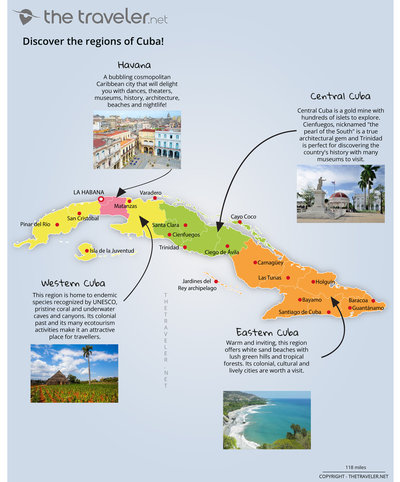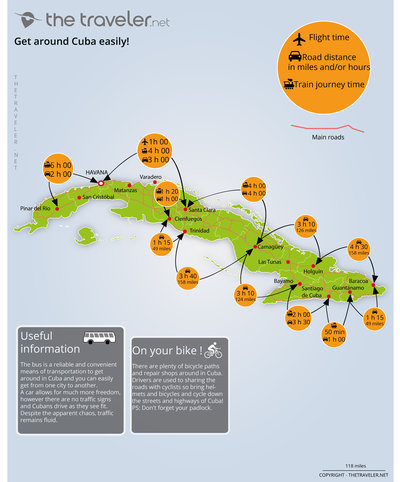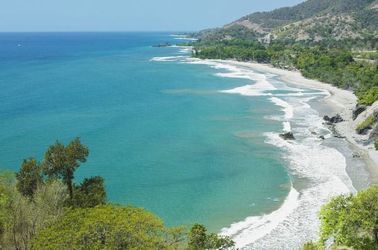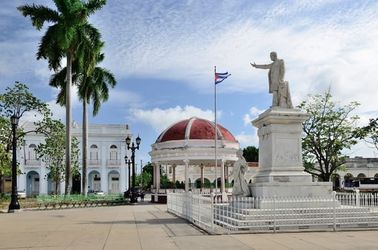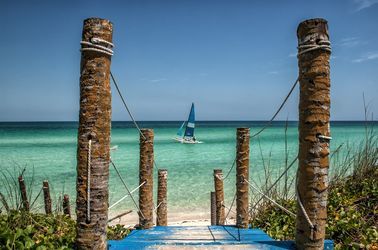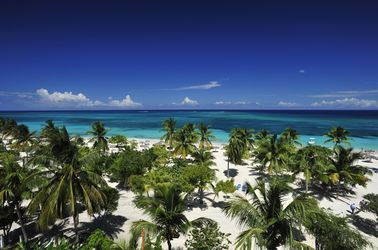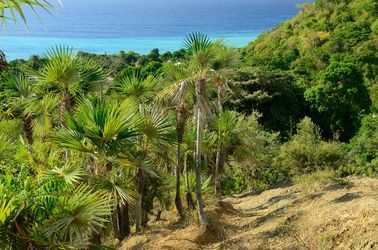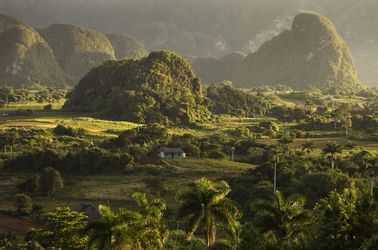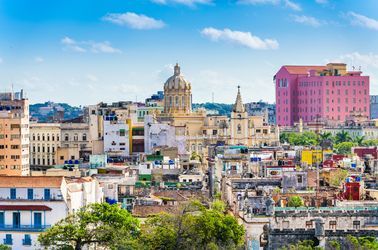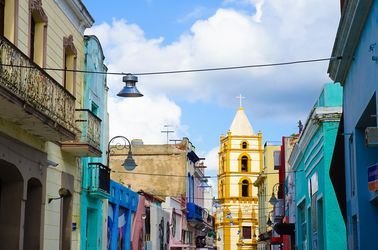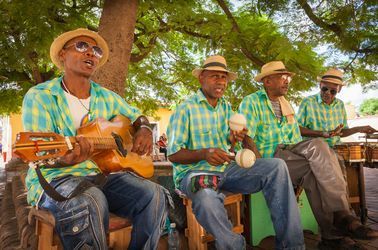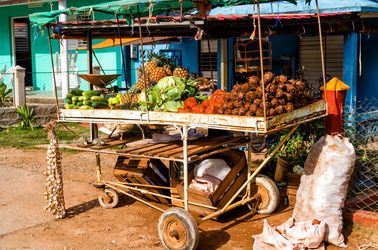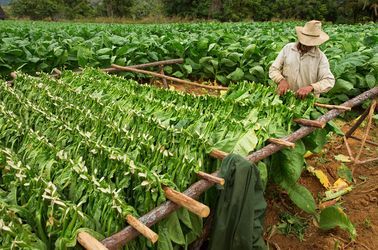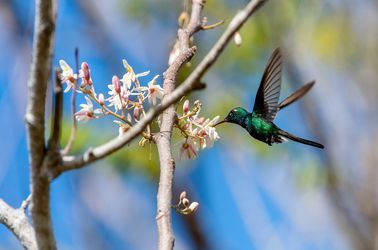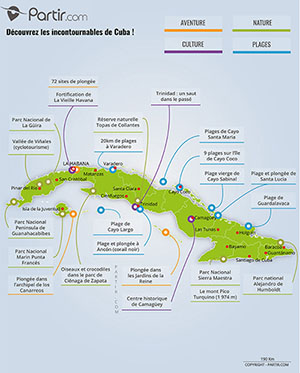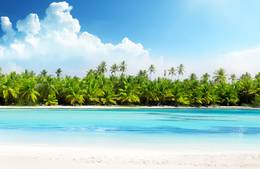Plan an amazing trip to Cuba
Welcome to the biggest archipelago of the West Indies, located east of Mexico. Cuba is a great destination for holiday makers, offering year-round sunshine, hundreds of miles of beaches caressed by the Caribbean Sea and historical towns with colonial architecture. Bordering the Gulf of Mexico, the capital city of Havana concentrates much of the country's cultural and historical wealth. From the Morro Castle to the Museum of the Revolution, there are plenty of things to do, a promising trip set to be both interesting and unforgettable.

Ernesto's tips, Local guide in Cuba
Best time to go to Cuba
You can visit Cuba all year, just remember to take into account the weather conditions: from November to April it's the dry season (very little rain and warmer temperatures, around 25ºC, but possible arrival of cooler fronts from the North) and then the rainy season, from May to October (higher temperatures, heavy showers and risk of tropical cyclones).
My favorite month: MARCH! November and March are the months that I particularly recommend, because the temperatures are very pleasant (around 25ºC), there is hardly any rain and generally fewer people.
How to go Cuba ?
What are the arrival airports?
Choose the closest airport to where you are staying.From which airport should I leave?
Check the flight calendar for departures from Cuba cities served by direct flights.What to see and what to do in Cuba
Ernesto answers your most frequently asked questions
First time in Cuba? Two weeks and you're looking to explore, connect with nature and relax? A good plan would be to visit Havana, the region of Viñales, the Bay of Pigs, Cienfuegos, Trinidad and its surroundings and spend the last few days in Cayo Santa Maria. There is much more to see, but you'll need a bit more time to explore Camagüey, Santiago and Baracoa. An itinerary in the South of the country: Camagüey, Bayamo, Santiago, Baracoa, Gibara and the beautiful beaches of Guardalavaca. The region is a lot less developed and therefore, has an extraordinary charm.
Experience one of Cuba's many cultural events: Remedios' las Parrandas (Carnival) at Christmas, the Poor Cinema International Festival (April-May) in Gibara, the Havana Biennial (May-June), the Cigar Festival in Havana (end of February), las Romerias (in May) in the city of Holguin and the Fire Festival and Santiago's Carnival in July.
Cuba is one of the safest countries in the region which is an asset for tourism... Certainly, you may come across pickpockets, touts and small scams... as in any touristic country. However, the climate of safety that prevails in Cuba allows tourists to stroll leisurely around the island. All you need to do is stick to a few guidelines:
- pay attention to your possessions (bag, camera ...)
- do not wear flashy jewelry
- make photocopies of your passport
- do not change money and do not buy cigars on the street
- - avoid tourist traps ("exceptional concerts", "restaurants that offer unbeatable « set menus »", "cheap cigars at a special price"...)
Cuban cuisine is mostly varied, inspired by African, Creole, Spanish and American dishes. Most local dishes include beans, rice, plantain, cassava, pork, chicken, fish and crayfish. You won't find many green vegetables but there are plenty of tropical fruits like guava, papaya and delicious mangoes in the summer. Plantain bananas are the main ingredient of most dishes including tostones. To quench your thirst, you can also try some Cuban beer (Cristal or Bucanero) or taste a good Cuban rum on the rocks or in a cocktail.
There are plenty of souvenir shops in the main cities such as Havana and Trinidad. Bring back some coffee, a bottle of rum or a CD of local music. Avoid buying fake cigars and purchase them straight from the factories or official retailers, Casas del Habano. The old towns of Havana and Trinidad are full of small artisan shops where you can purchase all sorts of handicrafts, including embroidery and jewellery.
Absolutely! Most hotel resorts are adapted to families with children, especially in Cayos. There are plenty of activities suitable for children in big touristic cities like Havana and lots of beaches for kids to have fun in the sun.
Guest houses are everywhere in Cuba. It's a great way to meet locals and discover the daily life of Cuban families. For those looking for comfort, there are certain guest houses just as nice as 5-star hotels. In Cuba, especially in cities classified as World Heritage by UNESCO, you can find charming boutique hotels. However, the prettiest beaches are crowded with large hotel complexes, some of which offer incredible luxury.
Although this has improved in recent years, accessing internet is still pretty complicated.
To connect, you need to buy a Nauta card (1 hour = $ 2 CUC) and go to places where public antennas have been installed (often near large central squares or hotels). You can buy these cards in ETECSA sales offices (Cuban telephone operator) and in some hotels.
GPS tracking does not work in Cuba but you can use other smartphone applications like Maps.me, OfflineMaps or CityMaps2Go, which don't need the Internet to work. Important - it is better to download these apps and maps before leaving for Cuba.
Phone calls abroad are expensive. The easiest option is to buy a Propia card ($ 5, $ 10, $ 20 CUC) that allows you to call abroad from a phone booth or a landline. It's also possible to buy a local chip for your mobile phone in the ETECSA offices.
The roads are in good condition although smaller roads are sometimes rutted. Remember to pay attention as there are many hitchhikers, bicycles, and animals. To rent a car, you need to go to approved agencies which all belong to the Cuban government: VIA-Transgaviota, Cubacar, Havanautos, REX. These agencies also have partners abroad who are able to offer car rentals. Beware of online scams that are sometimes difficult to spot.
Tourists can travel freely to the main regions of Cuba without a set itinerary or a tour group. Nowadays it's possible to organize your trip online. However, difficulties connecting to internet and the language barrier can interfere with communication and it's sometimes wiser to book through a travel agency.
- Lone travellers are often hassled by local scammers
- Some busy tourist resorts have lost their authentic charm
- Cigars, old American cars, lively music, sensual dancing and other typically Cuban clichés.
- Remarkable Spanish colonial-style architecture
- Historical sites listed as UNESCO World Heritage Sites, such as Old Havana
- Beautiful beaches for relaxing and bathing

